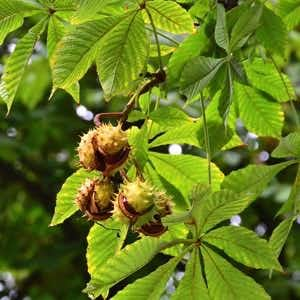
You can see varicose veins as lumpy twisted veins under the skin. They tend to stick up from the surface of the limb (usually the leg or foot). That distinguishes them from spider veins that are visible on the skin, but not raised. Both spider veins and varicose veins are signs that the veins are not doing a good job returning blood to the heart. This can lead to symptoms like tired legs, night cramps or swelling in the ankles and legs. These problems may not always be caused by venous insufficiency, but if you experience any of them, you might want to discuss the situation with your healthcare provider. In some instances, an herbal extract might help.
Horse Chestnut Extract Helps Reduce Fluid Buildup:
Q. I have had a water retention problem since surgery in 2019. Diuretics have not helped. I have read that horse chestnut is good for getting rid of edema. Is that true?
A. Horse chestnut (Aesculus hippocastanum) is a traditional remedy for varicose veins and edema. Most studies of horse chestnut extract or its active ingredients escin and esculin were done in animals or tissue cultures.
There are few clinical trials. However, a decade ago, a Cochrane Review surveyed the existing trials (Cochrane Database of Systematic Reviews, Nov 14, 2012).
The authors concluded:
“The evidence presented suggests that HCSE [horse chestnut seed extract] is an efficacious and safe short-term treatment for CVI [chronic venous insufficiency].”
This natural product may not work any better than diuretics for your edema, but the risks of trying it are low.
Managing Tired Legs with Horse Chestnut Extract:
Q. At 45, I started to notice spider and varicose veins in my legs. Taking horse chestnut extract and wearing compression socks has kept my legs from getting any worse over the last 12 years. At 57, I am able to be on my feet working retail 12 hours each day. If I run out of horse chestnut, I notice the difference. I also find it helpful to elevate my legs at night.
A. Varicose veins are a red flag for venous insufficiency. In this condition, the one-way valves in the veins of the legs don’t work well enough to keep blood flowing swiftly back to the heart.
Horse chestnut seed extract has long been used to treat venous insufficiency. Inflammation contributes to chronic venous disease (Labropoulos, Advances in Therapy, online Feb. 13, 2019). Horse chestnut seed extract appears to have anti-inflammatory activity, which might explain why it can be helpful (Braga et al, European Review for Medical and Pharmacological Sciences, July 2012). Recent research confirms that escin and other components of horse chestnut extract have measurable anti-inflammatory activity (Molecules, June 22, 2021).
Other Approaches to Tired Legs:
You are smart to be elevating your legs at night. Doctors frequently recommend this practice for people with tired legs, varicose veins or venous insufficiency. They often urge patients to stay active, but not to stand in one spot for long stretches of time. In addition, they suggest not crossing the legs when sitting.
Your healthcare provider might also recommend compression hose. Sometimes, venous insufficiency leads to venous ulcers, open sores on the legs that may be difficult to heal. Wearing compression hose can help prevent such problems (Ratliff et al, Journal of Wound, Ostomy, and Continence Nursing, Jul-Aug. 2016). Compression hose or socks reduce swelling, fatigue and aching in tired legs (Weiss & Duffy, Dermatologic Surgery, Sep. 1999).
Citations
- Pittler M et al, "Horse chestnut seed extract for chronic venous insufficiency." Cochrane Database of Systematic Reviews, Nov 14, 2012. doi: 10.1002/14651858.CD003230.pub4
- Labropoulos N, "How does chronic venous disease progress from the first symptoms to the advanced stages? A review." Advances in Therapy, March 2019. doi: 10.1007/s12325-019-0885-3.
- Braga PC et al, "Characterisation of the antioxidant effects of Aesculus hippocastanum L. bark extract on the basis of radical scavenging activity, the chemiluminescence of human neutrophil bursts and lipoperoxidation assay." European Review for Medical and Pharmacological Sciences, July 2012.
- Sharipov A et al, "Hypoglycemic and anti-inflammatory effects of triterpene glycoside fractions from Aeculus hippocastanum seeds." Molecules, June 22, 2021. doi: 10.3390/molecules26133784
- Ratliff CR et al, "Compression for primary prevention, treatment, and prevention of recurrence of venous leg ulcers: An evidence-and consensus-based algorithm for care across the continuum." Journal of Wound, Ostomy, and Continence Nursing, Jul-Aug. 2016. DOI: 10.1097/WON.0000000000000242

